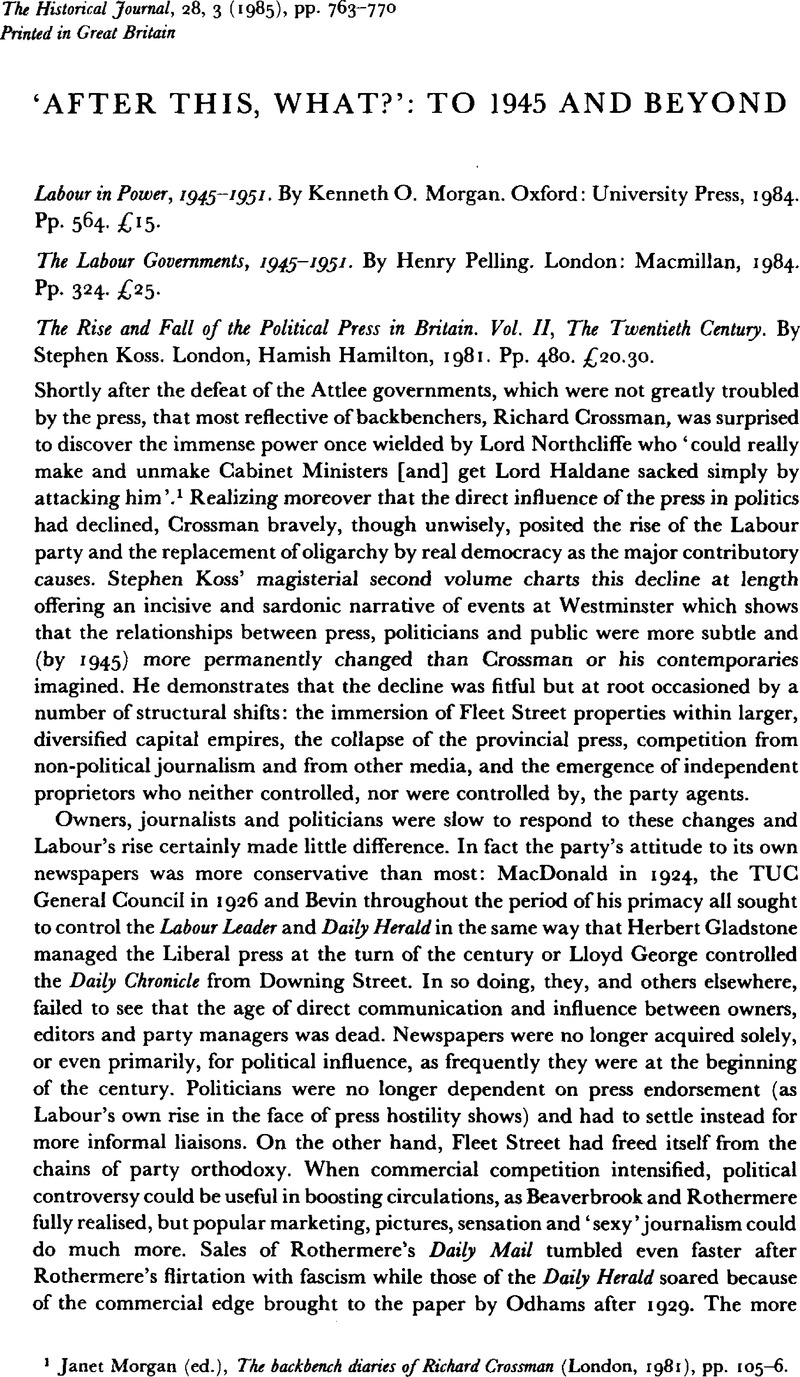Published online by Cambridge University Press: 11 February 2009

1 Morgan, Janet (ed.), The backbench diaries of Richard Crossman (London, 1981), pp. 105–6Google Scholar.
2 In 1931 Baldwin accused the press lords of wielding ‘power without responsibility – the prerogative of the harlot throughout the ages’.
3 Koss, p. 626, disputes the conclusion of MacCallum, R. B. & Readman, A., The British general election of 1945 (Oxford, 1947), pp. 181–2Google Scholar, but his argument rests on the importance of evening and weekly journals, The Times, and the Liberal rather than Labour preference of the News Chronicle. I find this argument unconvincing.
4 Miliband, R., Parliamentary socialism (London, 1961)Google Scholar; Coates, David, The Labour Party and the struggle for socialism (Cambridge, 1975)Google Scholar.
5 Addison's, Paul examination of the roots of ‘Butskellism’ in The road to 1945 (London, 1975)Google Scholar takes this argument further by making the Attlee administrations the product of the wartime consensus and the collectivist mandarins employed to operate its policies rather than of a distinct Labour ideology.
6 Cf. Foot, Michael, Aneurin Bevan, 1945–60 (Frogmore edn, 1975)Google Scholar, II, 215 on the probability that future generations would learn that Willink created the NHS in much the same way that the pupils of French Jesuits were taught that Napoleon was a general employed by the ancien régime.
7 Griffiths, quoted in Morgan, p. 44. For the defensive nature of the Labour Party between the wars see my article, ‘Expectations born to death: local Labour Party expansion in the 1920s’, in Winter, J. M. (ed.), The working class in modern British history (Cambridge, 1983), pp. 65–81CrossRefGoogle Scholar.
8 Arthur Deakin quoted in Harrison, Martin, Trade unions and the Labour Party since 1945 (London, 1960), p. 294Google Scholar.
9 For Morrison's failure to convince the press that Cripps' assumption of responsibility for strategic planning was not an adverse comment on his own management of that function, see Pelling, pp. 179–82.
10 ‘C' Licences were held by road hauliers carrying their own goods. Morrison argued that their nationalization was essential if the large commercial haulage fleets were to be satisfactorily controlled. But the measure threatened small, local carriers also to say nothing of the Co-operative Movement which owned one of the largest fleets. Pressure from these interests and from those who feared the electoral consequences of state intervention in such a personalized economic sector prompted the cabinet to accept Douglas Jay's Commons’ amendment for their exclusion.
11 In his In place of fear (London, 1952), p. 119Google Scholar, Bevan argued that the boundary of public and private ownership would be located differently in different nations but that ‘in the western world’ it would be determined by ‘the extent to which large aggregations of private capital have coagulated into monopolies and semi-monopolies’.
12 However, José Harris, ‘Did British workers want the welfare state?’, in Winter, J. M., The working class, pp. 200–14Google Scholar, throws doubt on the notion that there was great popular demand for a welfare state before 1945.
13 Pelling's description of Bevan, p. 262.
14 Gupta, P. S., ‘Imperialism and the Labour Government of 1945–51’ in Winter, J. M., The working class, pp. 99–124Google Scholar.
15 They did not however support the decision to manufacture atomic weapons since, during the lifetime of the Attlee governments, they knew nothing of it.
16 Bevan had earlier accepted the ‘principle’ of prescription charges on the assumption, according to Foot, Michael, Aneurin Bevan, p. 290Google Scholar, that the principle would never be put into practice. Cf. Morgan, p. 161.
17 The position of that erstwhile ideologue, John Strachey, is illuminating. He consideredresigning in April 1951 but thought the issue was not large enough: see Thomas, Hugh, John Strachey (London, 1973), p. 266Google Scholar. Many members of the PLP at that time seem to have felt the same way and to have been thoroughly scandalized by the tone of Bevan's resignation speeches to both the house and to the party.
18 I am aware that neither Bevan, Wilson nor Freeman can accurately be termed ‘Bevanites’.